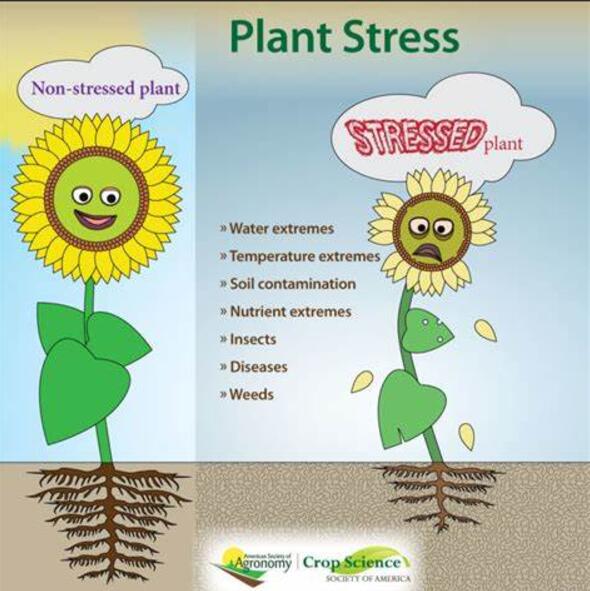过氧化物酶体依赖性转录因子响应拟南芥和番茄的生物和非生物胁迫
IF 6.8
Q1 PLANT SCIENCES
引用次数: 0
摘要
植物通过复杂的机制来适应环境的挑战。它们依靠诸如活性氧(ROS)之类的信号分子进行细胞间的通讯,迅速激活代谢途径以应对压力。过氧化物酶体是调节活性氧代谢和信号传导的关键亚细胞器,它包含了一个广泛的酶促抗氧化系统,包括过氧化氢酶(CAT)和抗坏血酸-谷胱甘肽循环酶。本研究确定了一组过氧化氢酶依赖性转录因子(TFs)在拟南芥的非生物和生物应激反应中进行转录调节。此外,我们还研究了过氧化物酶体在番茄等重要作物中的调控是否保守,旨在加深我们对过氧化物酶体在植物逆境反应中的功能的理解。这些拟南芥TFs在番茄中的同源基因均在胁迫下受到调控,响应不同的不利条件,包括盐胁迫和热胁迫,以及病原体和/或草食动物的攻击,支持它们在胁迫反应中的保守功能。研究结果指出,拟南芥和番茄在多种胁迫下受调控的这些选定的TFs可作为生物技术应用的靶点,以增强作物抵御气候变化挑战的能力。本文章由计算机程序翻译,如有差异,请以英文原文为准。
Peroxisome-dependent transcription factors respond to biotic and abiotic stresses in Arabidopsis and tomato
Plants adapt to environmental challenges through complex mechanisms. They rapidly activate metabolic pathways in response to stress, relying on signaling molecules such as reactive oxygen species (ROS) for cell-to-cell communication. Peroxisomes, key subcellular organelles that regulate ROS metabolism and signaling, house a wide enzymatic antioxidant system including catalases (CAT) and the ascorbate-glutathione cycle enzymes. This study identifies a set of catalase-dependent transcription factors (TFs) transcriptionally regulated during abiotic and biotic stress responses in Arabidopsis. Additionally, it examines whether their regulation is conserved in an important crop like tomato, aiming to deepen our understanding on the functions of peroxisomes in plant stress responses. The orthologues of these Arabidopsis TFs in tomato were all regulated under stress, responding to different adverse conditions, including salt and heat stress, and pathogen and/or herbivore attack, supporting their conserved functionality in stress responses. The results pinpoint these selected TFs, regulated in response to multiple stresses in Arabidopsis and tomato, as targets for biotechnological applications to enhance crop resilience to cope with climate change challenges.
求助全文
通过发布文献求助,成功后即可免费获取论文全文。
去求助
来源期刊

Plant Stress
PLANT SCIENCES-
CiteScore
5.20
自引率
8.00%
发文量
76
审稿时长
63 days
期刊介绍:
The journal Plant Stress deals with plant (or other photoautotrophs, such as algae, cyanobacteria and lichens) responses to abiotic and biotic stress factors that can result in limited growth and productivity. Such responses can be analyzed and described at a physiological, biochemical and molecular level. Experimental approaches/technologies aiming to improve growth and productivity with a potential for downstream validation under stress conditions will also be considered. Both fundamental and applied research manuscripts are welcome, provided that clear mechanistic hypotheses are made and descriptive approaches are avoided. In addition, high-quality review articles will also be considered, provided they follow a critical approach and stimulate thought for future research avenues.
Plant Stress welcomes high-quality manuscripts related (but not limited) to interactions between plants and:
Lack of water (drought) and excess (flooding),
Salinity stress,
Elevated temperature and/or low temperature (chilling and freezing),
Hypoxia and/or anoxia,
Mineral nutrient excess and/or deficiency,
Heavy metals and/or metalloids,
Plant priming (chemical, biological, physiological, nanomaterial, biostimulant) approaches for improved stress protection,
Viral, phytoplasma, bacterial and fungal plant-pathogen interactions.
The journal welcomes basic and applied research articles, as well as review articles and short communications. All submitted manuscripts will be subject to a thorough peer-reviewing process.
 求助内容:
求助内容: 应助结果提醒方式:
应助结果提醒方式:


